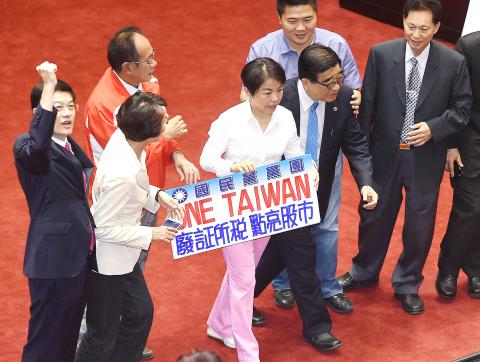The two major political parties yesterday found common ground as lawmakers passed an amendment to abolish the yet-to-be-implemented capital gains tax by an overwhelming majority.
The Chinese Nationalist Party (KMT) and the Democratic Progressive Party (DPP) caucuses submitted separate proposals to amend the Income Tax Act (所得稅法) to terminate the tax on capital gains, effective Jan. 1.
The difference in the versions lay in the explanatory section. The KMT stressed a “dynamic relationship” between the securities transaction tax and the capital gains tax, while the DPP panned President Ma Ying-jeou (馬英九) for advancing the policy. The DPP’s version was voted down.

Photo: Liao Chen-huei, Taipei Times
The KMT version, which was put to a vote along with a proposal from the New Alliance — which also called for ending the capital gains tax — cleared the floor, with KMT Legislator Tseng Chu-wei (曾巨威) abstaining from the vote and People First Party Legislator Thomas Lee (李桐豪) voting against the measure.
Tseng, a former finance professor nicknamed “the cannon of tax reform,” has long been a strong supporter of the capital gains tax, and said that yesterday’s action was the “black Friday of tax reform.”
“As a finance and tax academic, I am deeply regretful and heart-stricken. We should not be afraid to make wrong decisions,” Tseng said.
“The only thing we should be afraid of is not being able to learn from mistakes to find an answer that is more reasonable and fair,” he said.
He said he still hopes the “distorted tax structure” — including the securities transaction tax — could be altered to restore the idea of fairness that “as long as there are gains, tax should be levied.”
A resumption of the capital gains tax was forced by the KMT in 2012 “with its substance totally out of line,” and still saw its end yesterday after several rounds of revisions, he said.
While capital gains will not be taxed, “the Ministry of Finance still will not reduce the current securities transaction tax,” Lee said. “Taiwan’s capital market will be seriously restricted.”
A 0.3 percent transaction tax is imposed on stock market investors.
DPP Legislator Lee Ying-yuan (李應元) said Ma had foisted the policy on the nation without proper discussions and the KMT “lacked core values,” demonstrated by its former and current presidential candidates proposing different versions of the amendment.
Lee said tax reforms should be deliberated “as a whole” if changes are to be made in the name of social fairness and justice.
The proposal to tax some capital gains from the stock market was passed by the legislature in the middle of 2013, but its implementation was later delayed to 2018 because of fears it would negatively affect turnover in the local stock market.
Opponents said the mere existence of the measure was scaring away investors.
Additional reporting by CNA

INVESTIGATION: The case is the latest instance of a DPP figure being implicated in an espionage network accused of allegedly leaking information to Chinese intelligence Democratic Progressive Party (DPP) member Ho Jen-chieh (何仁傑) was detained and held incommunicado yesterday on suspicion of spying for China during his tenure as assistant to then-minister of foreign affairs Joseph Wu (吳釗燮). The Taipei District Prosecutors’ Office said Ho was implicated during its investigation into alleged spying activities by former Presidential Office consultant Wu Shang-yu (吳尚雨). Prosecutors said there is reason to believe Ho breached the National Security Act (國家安全法) by leaking classified Ministry of Foreign Affairs information to Chinese intelligence. Following interrogation, prosecutors petitioned the Taipei District Court to detain Ho, citing concerns over potential collusion or tampering of evidence. The

‘FORM OF PROTEST’: The German Institute Taipei said it was ‘shocked’ to see Nazi symbolism used in connection with political aims as it condemned the incident Sung Chien-liang (宋建樑), who led efforts to recall Democratic Progressive Party (DPP) Legislator Lee Kun-cheng (李坤城), was released on bail of NT$80,000 yesterday amid an outcry over a Nazi armband he wore to questioning the night before. Sung arrived at the New Taipei City District Prosecutors’ Office for questioning in a recall petition forgery case on Tuesday night wearing a red armband bearing a swastika, carrying a copy of Adolf Hitler’s Mein Kampf and giving a Nazi salute. Sung left the building at 1:15am without the armband and apparently covering the book with a coat. This is a serious international scandal and Chinese

Seventy percent of middle and elementary schools now conduct English classes entirely in English, the Ministry of Education said, as it encourages schools nationwide to adopt this practice Minister of Education (MOE) Cheng Ying-yao (鄭英耀) is scheduled to present a report on the government’s bilingual education policy to the Legislative Yuan’s Education and Culture Committee today. The report would outline strategies aimed at expanding access to education, reducing regional disparities and improving talent cultivation. Implementation of bilingual education policies has varied across local governments, occasionally drawing public criticism. For example, some schools have required teachers of non-English subjects to pass English proficiency

TRADE: The premier pledged safeguards on ‘Made in Taiwan’ labeling, anti-dumping measures and stricter export controls to strengthen its position in trade talks Products labeled “made in Taiwan” must be genuinely made in Taiwan, Premier Cho Jung-tai (卓榮泰) said yesterday, vowing to enforce strict safeguards against “origin laundering” and initiate anti-dumping investigations to prevent China dumping its products in Taiwan. Cho made the remarks in a discussion session with representatives from industries in Kaohsiung. In response to the US government’s recent announcement of “reciprocal” tariffs on its trading partners, President William Lai (賴清德) and Cho last week began a series of consultations with industry leaders nationwide to gather feedback and address concerns. Taiwanese and US officials held a videoconference on Friday evening to discuss the